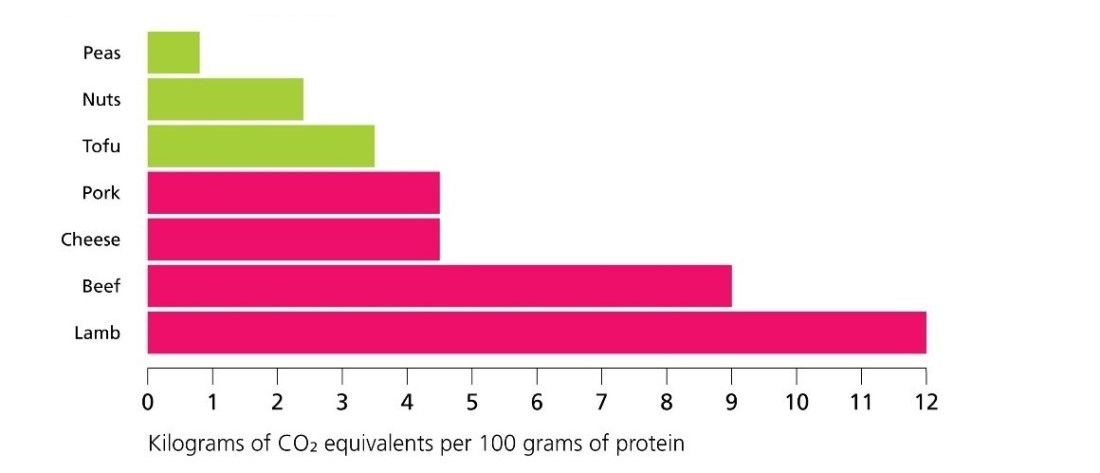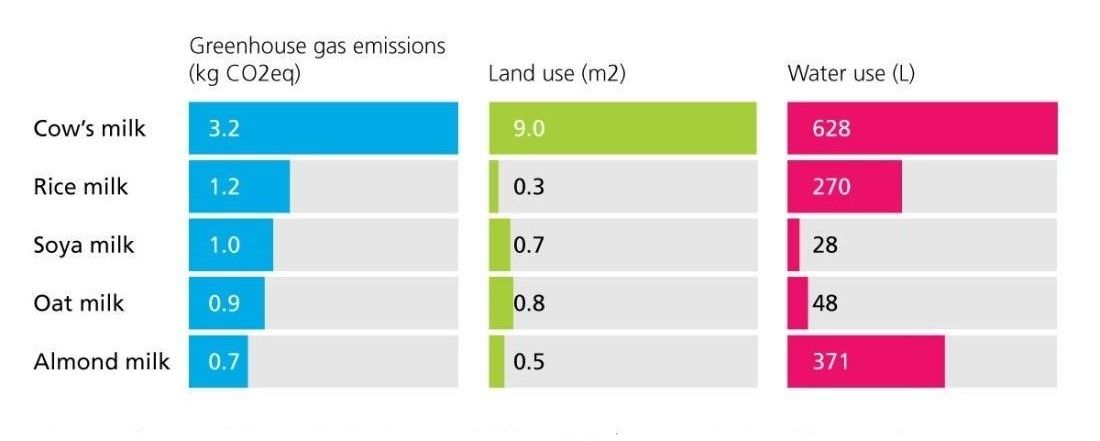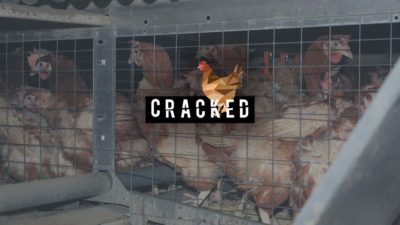Meat, milk and the environment – myths busted

Cutting meat, fish, eggs and dairy from your diet is the single most effective action you can take to lower your impact on the planet.
In a nutshell:
- Livestock farming produces 14.5 per cent of greenhouse gases – more than all the world’s transport put together.
Greenhouse gases from livestock farming arise from the following:
| Deforestation, making way for grazing cattle and animal feed production (eg soya) | Carbon dioxide |
| Manure/slurry ponds and lagoons from large factory farms | Methane and nitrous oxide |
| Fertilisers used to grow animal feed crops | Nitrous oxide |
| Energy from fossil fuels, used to grow, process and transport animal feed, animals, their meat and milk | Carbon dioxide |
| Vast numbers of cows burping and farting as a result of fermentation in their digestive systems | Methane |
- Animal agriculture is the biggest land user in the UK – occupying almost half of all land.
- If instead of growing so many crops to feed livestock, we grew food for humans, we could produce more than enough food for everyone in the UK.
- If we reforested pasture land it would compare to cancelling nine years’ worth of current UK greenhouse gas emissions.
- Meat, fish, eggs and dairy use 83 per cent of all farmland in the world, produce 58 per cent of agricultural greenhouse gas emissions but provide only 37 per cent of our protein and 18 per cent of our calories.
- Going vegan could halve your greenhouse gas emissions from food.
- Grass-fed beef is not the environmentally friendly choice: grass-fed cows still produce methane – more in fact than factory-farmed cows.
- There will only ever be enough food for everyone if meat consumption falls drastically.
- What you eat matters a lot more than where it comes from: the carbon cost of shipping avocados from Mexico only accounts for eight per cent of the total carbon footprint of avocados.
- If you want a more sustainable diet, eating no meat is always better than eating the most sustainable meat.
Comparing the highest emitting plant foods with the lowest emitting animal foods

Source: Hannah Ritchie and Max Roser, 2020.
Plant milks
- Plant milks all have a lower environmental impact than cow’s milk.
- Of all the plant milks almond milk uses the most water requiring around 371 litres of water per kilogram. Cow’s milk requires 628 litres per kilogram (see below).
Cow’s milk has a higher environmental impact than plant milks

Source: Poore and Nemecek, 2018.
- 80 per cent of the world’s soya is used to feed chickens, pigs, cows and farmed fish.
- Forests are being destroyed to make way for cattle grazing and soya crop expansion, so that people can eat more meat.
- Bottom line: If you want to protect the planet, go vegan!
Read the full story:
Meat and dairy are far worse for the planet than vegan diets – even if they include avocados!
Changing the way you eat is the single most effective action you can take as an individual to lower your impact on the planet, according to scientists. According to livestock farmers, on the other hand, it’s all fine so long as you eat their grass-fed locally grown meat and dairy! So, who do you believe?
Avocados, almonds and soya – again!
There’s been a lot of nonsense in the press recently with some livestock farmers suggesting that vegans, who eat avocados, almonds and soya, are doing more harm to the planet than people who eat local meat and dairy. This is a classic case of diversionary tactics, not supported by any real facts.
Firstly, the idea that only vegans eat avocados, almonds and soya is ridiculous. Even if that were true, a vegan diet would still be more sustainable than one containing meat and dairy, even if it was locally sourced. Research shows that meat and dairy lie at the heart of the climate crisis – and that includes locally grown grass-fed beef!
Livestock farming produces 14.5 per cent of all anthropogenic (manmade) greenhouse gases says the Food and Agricultural Organisation of the United Nations – more than all the world’s transport put together.
Greenhouse gases from animal agriculture arise from the following:
- Carbon dioxide from mass deforestation, making way for grazing and animal feed production
- Manure ponds and lagoons emitting methane and nitrous oxide – another dangerous greenhouse gas
- Energy from fossil fuels, used to grow, process and transport animal feed, animals, their meat and milk
- Nitrous oxide released from fertilisers used to grow animal feed
- Vast numbers of cows burping and farting the extra-potent greenhouse gas, methane (as a result of fermentation in their digestive system)
Swapping your car for a bicycle, recycling, avoiding food waste and so on are all great ideas, but going vegan is the single most effective way to cut your emissions and if we all do it, we may stop the climate crisis and produce more than enough food for everyone.
Inefficient use of land
Land use changes could not only provide enough food for all, but could also lead to huge reductions in greenhouse gas (GHG) emissions. Animal agriculture is the biggest land user in the UK, occupying almost half of all land. Harvard researchers say that if we reforest farmland used for pasture and convert cropland used for animal feed to grow food for humans, we could produce more than enough protein and calories for everyone in the UK. At the same time, it would offset the equivalent of nine years’ worth of current UK emissions. They say: “Radical action, far beyond that currently planned, is required to reduce GHGs steeply and rapidly in line with the Paris Agreement.”
Viva! has been saying this for years but only recently are the Government beginning to acknowledge that things must change if we are to achieve their climate targets. We are running out of time and action is long-overdue!
Eating up the planet
Environmental researcher at the University of Oxford, Joseph Poore, says: “A vegan diet is probably the single biggest way to reduce your impact on planet Earth.” Poore’s research shows that globally, meat, fish, eggs and dairy use 83 per cent of farmland, produce 58 per cent of agricultural emissions yet provide only 37 per cent of our protein and a paltry 18 per cent of our calories. Moving towards a plant-based diet, Poore says, has “transformative potential” and could halve food-related emissions.
Peter Scarborough, Associate Professor at the University of Oxford, agrees that going vegan could halve your greenhouse gas emissions from food. Given that reducing meat and dairy could slow climate change very rapidly, changing the way we eat should be a top priority at COP26, the next United Nations Climate Change Conference.
Dairy, beef and bullshit
Suggesting that it’ll all be alright if meat-eaters switch to grass-fed beef is irresponsible and flawed on many levels – there’s not enough land for this system to feed everyone, and grass-fed cows still produce methane (more in fact than factory-farmed cows). Environmental researcher, Dr Tara Garnett says: “Grazing livestock are net contributors to the climate problem, as are all livestock. Rising animal production and consumption, whatever the farming system and animal type, is causing damaging greenhouse gas release and contributing to changes in land use.”
Food for all
The EAT-Lancet Commission on healthy diets from sustainable food systems brought together 37 world-leading scientists from across the globe to answer the question: Can we feed a future population of 10 billion people a healthy diet within planetary boundaries? The answer is yes, but it will be impossible without transforming eating habits, improving food production and reducing food waste. They said: “Even small increases in the consumption of red meat or dairy foods would make this goal difficult or impossible to achieve.”
The report was co-authored by Walter Willett, professor of epidemiology and nutrition at Harvard School of Public Health. who says: “Transformation to healthy diets by 2050 will require substantial dietary shifts… A diet rich in plant-based foods and with fewer animal source foods confers both improved health and environmental benefits.”
Do food miles matter?
Let’s look at that avocado again. Contrary to popular belief, what you eat matters a lot more than where it comes from. Our World in Data, a leading organisation from the University of Oxford who publish global data and research, explains how the 0.21 kilograms of CO₂ equivalents generated by shipping one kilogram of avocados from Mexico to the UK amounts to just eight per cent of avocados’ total carbon footprint. They say: “Even when shipped at great distances, its emissions are much less than locally-produced animal products.” Spanish avocados would have an even lower footprint.
They also compared the emissions (kilograms of CO₂ equivalents per 100 grams of protein) of the highest-emitting plant foods with the lowest-emitting meat and dairy. They found the highest impacting peas (0.8) nuts (2.4) and tofu (3.5) all compared favourably against the lowest impact lamb (12), beef (9), cheese (4.5) and pork (4.5). So, if you want a lower-carbon diet, eating less meat is better than eating the most sustainable meat.
Then there are almonds – also vilified as an apparently exclusive vegan food. Compared to other plant foods, almonds may be a bit thirsty, but almond milk doesn’t require as much water as cow’s milk; 371 litres per kilogram compared to 638 for cow’s milk. Also, almonds grow on trees, which capture and store carbon, cow’s milk is produced by cows, that belch methane. So, almond milk is still the better choice for the environment (see below).
A last word on soya
Lastly, comments about soya-eating vegans being bad for the environment would be laughable if the irony wasn’t so tragic. Of course, much of the deforestation in the Amazon, and the loss of biodiversity that goes with it, is to make way for soya – but the vast majority of soya grown there ends up as feed for chickens, pigs, cows and farmed fish. We are allowing forests to be destroyed to make way for soya crop expansion, so that people can eat more meat – it makes no sense.
Scientists say: “Considering the high contribution of agriculture to anthropogenic GHG emissions, the choice of food production practices can be a problem or part of a solution in addressing climate change.” Go vegan for the planet and future generations.




